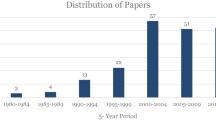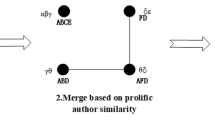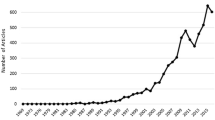Abstract
Experimental and empirical evidence highlights the role of networks on social outcomes. This paper tests the properties of exogenously fixed networks in team production. Subjects make the same decisions in a team work environment under four different organizational networks: the line, the circle, the star, and the complete network. In all the networks, links make information available to neighbors. This design allows us to analyze decisions across networks and a variety of subject types in a standard linear team production game. Contribution levels differ significantly across networks and the star is the most efficient incomplete network. Moreover, our results suggest that subjects act as conditional cooperators with respect to the information received from the network.
Similar content being viewed by others
References
Andreoni, J., & Petrie, R. (2004). Public goods experiments without confidentiality: a glimpse into fund-raising. Journal of Public Economics, 88, 1605–1623.
Berninghaus, S. K., Ehrhart, K., & Ott, M. (2006). A network experiment in continuous time: the influence of link costs. Experimental Economics, 9, 237–251.
Berninghaus, S. K., Ehrhart, K., Ott, M., & Vogt, B. (2007). Evolution of networks—an experimental analysis. Journal of Evolutionary Economics, 17, 317–347.
Callander, S., & Plott, C. R. (2005). Principles of network development and evolution: an experimental study. Journal of Public Economics, 89, 1469–1495.
Carpenter, J. P. (2007). Punishing free-riders: how group size affects mutual monitoring and the provision of public goods. Games and Economic Behavior, 60, 31–55.
Cason, T., & Khan, F. (1999). A laboratory study of voluntary public goods provision with imperfect monitoring and communication. Journal of Development Economics, 58, 533–552.
Cassar, A. (2007). Coordination and cooperation in local, random and small world networks: experimental evidence. Games and Economic Behavior, 58, 209–230.
Choi, S., Gale, D., & Kariv, S. (2005). Behavioral aspects of learning in social networks: an experimental study. In J. Morgan (Ed.) Behavioral and experimental economics: Vol. 13. Advances in applied microeconomics.
Croson, R., & Marks, M. (1998). Identifiability of individual contributions in a threshold public goods experiment. Journal of Mathematical Psychology, 42, 167–190.
Deck, C., & Johnson, C. (2004). Link bidding in a laboratory experiment. Review of Economic Design, 8(4), 359–372.
Eckel, C., Fatas, E., & Wilson, R. (2009, forthcoming). An experimental analysis of status in organizations. Journal of Public Economic Theory.
Falk, A., & Kosfeld, M. (2003). It’s all about connections: evidence on network formation (IZA discussion paper no. 777).
Fatas, E., Godoy, S., & Solaz, H. (2009). Low powered monitoring systems in team production: an experimental analysis (LINEEX working paper). University of Valencia.
Fatas, E., Meléndez-Jiménez, M. A., & Solaz, H. (2008). Cooperation, punishment and networks (Mimeo). LINEEX.
Fatas, E., Meléndez-Jiménez, M. A., & Solaz, H. (2010). An experimental analysis of team production in networks (Discussion Papers in Economic Behaviour 2010-03). ERICES (available at http://www.erices.es/upload/workingpaper/6_0310.pdf).
Fischbacher, U. (2007). z-tree: Zurich toolbox for ready-made economic experiments. Experimental Economics, 10(2), 171–178.
Fischbacher, U., Gächter, S., & Fehr, E. (2001). Are people conditionally cooperative? Evidence from a public goods experiment. Economic Letters, 71(3), 397–404.
Fox, J., & Guyer, M. (1978). Public choice and cooperation in n-person prisoner’s dilemma. Journal of Conflict Resolution, 22(3), 469–481.
Gachter, S., Fehr, E., & Kment, C. (1996). Does social exchange increase voluntary cooperation? Kyklos, 49(4), 541–554.
Goyal, S. (2005). Learning in networks. In G. Demange & M. Wooders (Eds.), Group formation in economics: networks, clubs and coalitions. Cambridge: Cambridge University Press.
Jackson, M. O. (2005). A survey of network formation models: stability and efficiency. In: G. Demange & M. Wooders (Eds.), Group formation in economics: networks, clubs and coalitions. Cambridge: Cambridge University Press.
Kirchkamp, O., & Nagel, R. (2007). Naive learning and cooperation in network experiments. Games and Economic Behavior, 58, 269–292.
Kosfeld, M. (2004). Economic networks in the laboratory: a survey. Review of Network Economics, 3, 20–41.
Ledyard, J. (1995). Public goods: a survey of experimental research. In A. Roth & J. Kagel (Eds.), The Handbook of Experimental Economics. Princeton: Princeton University Press.
Liang, K.-Y., & Zeger, S. L. (1986). Longitudinal data analysis using generalized linear models. Biometrika, 73, 13–22.
Riedl, A., & Ule, A. (2002). Exclusion and cooperation in social network experiments (Mimeo). University of Amsterdam.
Zelmer, J. (2003). Linear public goods experiments: a meta-analysis. Experimental Economics, 6(3), 299–310.
Author information
Authors and Affiliations
Corresponding author
Electronic Supplementary Material
Rights and permissions
About this article
Cite this article
Fatas, E., Meléndez-Jiménez, M.A. & Solaz, H. An experimental analysis of team production in networks. Exp Econ 13, 399–411 (2010). https://doi.org/10.1007/s10683-010-9248-2
Received:
Accepted:
Published:
Issue Date:
DOI: https://doi.org/10.1007/s10683-010-9248-2




